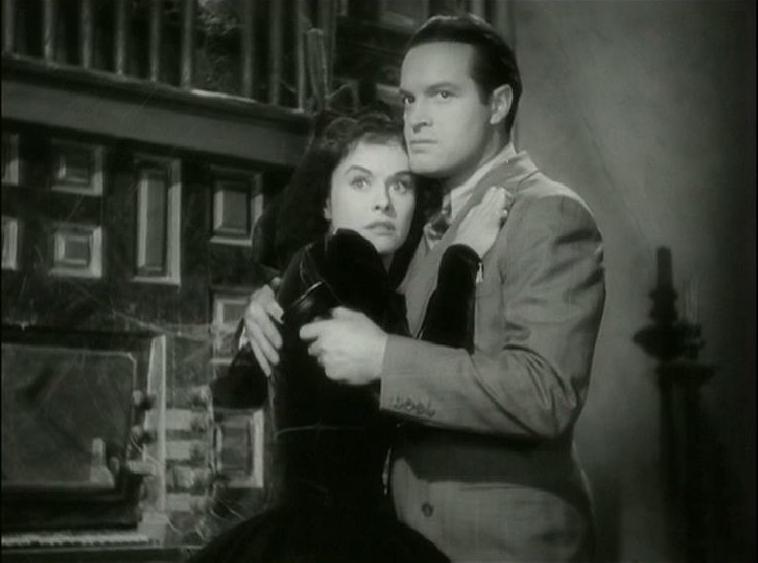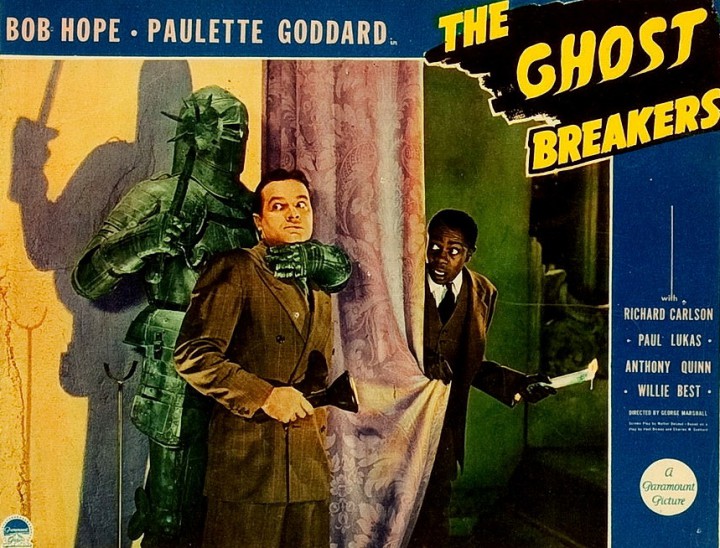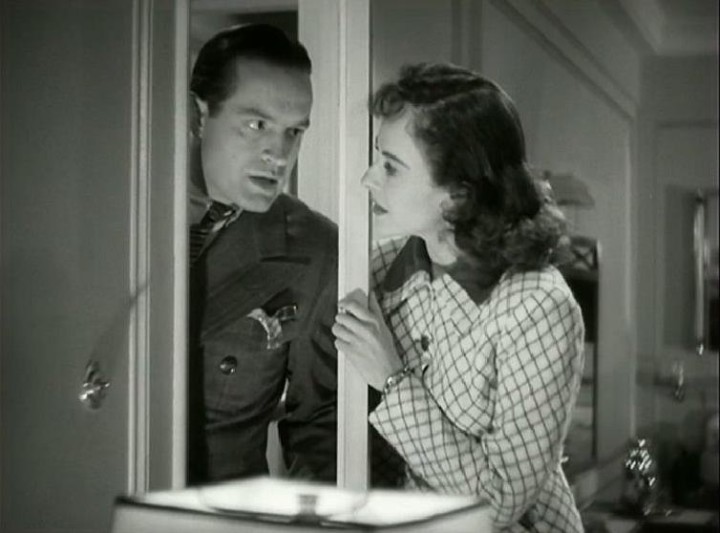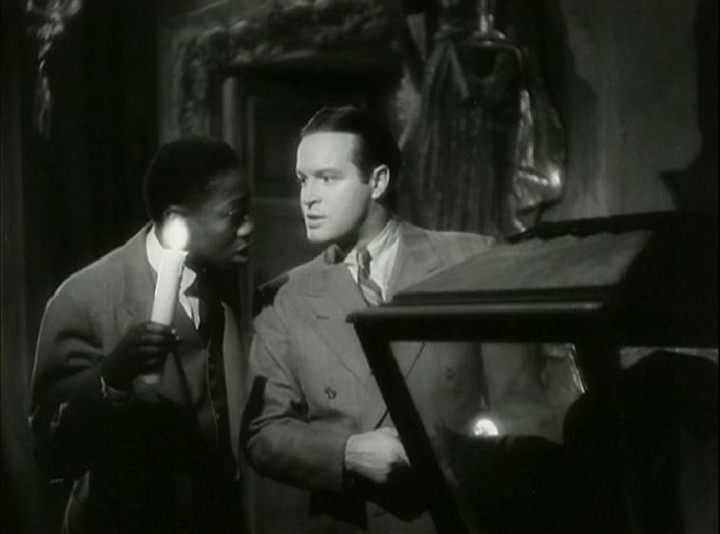It actually might be a little less effective as a mystery than The Cat and the Canary, but overall The Ghost Breakers is the better film—and one of the few truly great meshes of comedy and horror that never shorts either genre. It’s interesting to compare the play with the film. While very little of the play’s dialogue is in the film—the gag “There’s always money when the ghost walks” is retained intact—the outline of the plot and even the structure is there. Certain aspects of the plot have definitely been modernized—and one might say Hope-ified. The idea of the hero having shot a man based on some ancient Kentucky feud and hiding from the cops in the heroine’s room might have been fine earlier, but it wouldn’t play in 1940 (nor would it have passed the censors)—and Hope as a Kentucky gentleman isn’t happening. The film junks both the feud and the play’s premise that the heroine is some kind of moth-eaten Spanish royalty. In its place, the heroine is merely heiress Mary Carter (Paulette Goddard) and the hero is radio personality Lawrence L. Lawrence (Hope)—his middle name is Lawrence, too (“My folks had no imagination”)—who only thinks he’s shot a gangster. It’s fresher and better and it still gets the hero hiding in a steamer trunk and loaded onto a boat bound (in this case) for Cuba.
In both the play and the film, the big centerpiece is, of course, a haunted castle, but the film is much more elaborate in this regard. The play might’ve panicked ‘em in 1909—and maybe it plays better than it reads—but it’s pretty weak tea by comparison. About all the film retains here is the intrusion of the heroine into the proceedings and a variation on some antics involving a suit of armor. Another difference lies in the character of Lawrence’s manservant Alex (Willie Best), who identifies himself as “the old family detainer.” Our modern sensibilities may find Willie Best’s comedy a little on the un-PC side, which is unfortunate since Best was a talented performer, and it’s obvious here—and in the follow-up film that reteamed Hope, Goddard and him, Nothing But the Truth (1941). The character in the original play is another matter altogether. Wow. It’s strictly racist and has two basic jokes—the character is scared and obsessed with fried chicken. The film is very different, though Alex is still scared—but then so is Lawrence—but he’s also smart and even heroic in the final analysis. He’s also funny.
One of the brightest things about the film—borrowed from the approach of The Cat and the Canary—is making Hope’s character a wisecracking radio personality. In this case, he’s a Walter Winchell-like broadcaster who specializes in snarkily dishing the dirt on public figures, especially gangsters—which is what sets the whole plot in motion. Being Bob Hope, he also seems to specialize in making fun of his sponsor (“Cronin Coffee is the only coffee that lets you sleep and keeps you awake at the same time. There’s no chicory in it, no caffeine, no mocha, nothing … uh, nothing can change the peculiar flavor of Cronin Coffee, so our advice is keep it in the can”). He’s also a bit stuck on himself and a coward, but, of course, he’s a coward who can be swayed into a not-entirely willing hero for a pretty girl in distress. In other words, it’s a perfect Bob Hope character.
It’s unfortunate that this would be his last foray into the realm of horror comedy, because Hope’s nervous wisecracks are the perfect complement to the genre. (I harbor the suspicion that the same director’s 1945 Murder He Says was written for Hope and then handed over to Fred MacMurray.) Whether inquiring of “Mother Zombie” (Virginia Brissac) if he can interest her in a subscription to Weird Stories magazine, or merely opining, “A good laugh would be worth a lot of money at this point,” upon hearing a grim story, he’s at his absolute best—and in a way that never quite deflates the spookiness of it all, because he conveys the sense that it’s all bluster to try to make himself feel better. Viewers who think of Hope only in connection with his increasingly lame TV specials or those dismal movies with which he ended his career are in for a surprise with The Ghost Breakers. Here you get Hope at his absolute sharpest. This isn’t the phony hipster he devolved into. This is Hope back when he really was cool. Try it and see.
The Asheville Film Society will screen The Ghost Breakers Tuesday, Oct. 27, at 8 p.m. in Theater Six at The Carolina Asheville, hosted by Xpress movie critic Ken Hanke.








Before you comment
The comments section is here to provide a platform for civil dialogue on the issues we face together as a local community. Xpress is committed to offering this platform for all voices, but when the tone of the discussion gets nasty or strays off topic, we believe many people choose not to participate. Xpress editors are determined to moderate comments to ensure a constructive interchange is maintained. All comments judged not to be in keeping with the spirit of civil discourse will be removed and repeat violators will be banned. See here for our terms of service. Thank you for being part of this effort to promote respectful discussion.